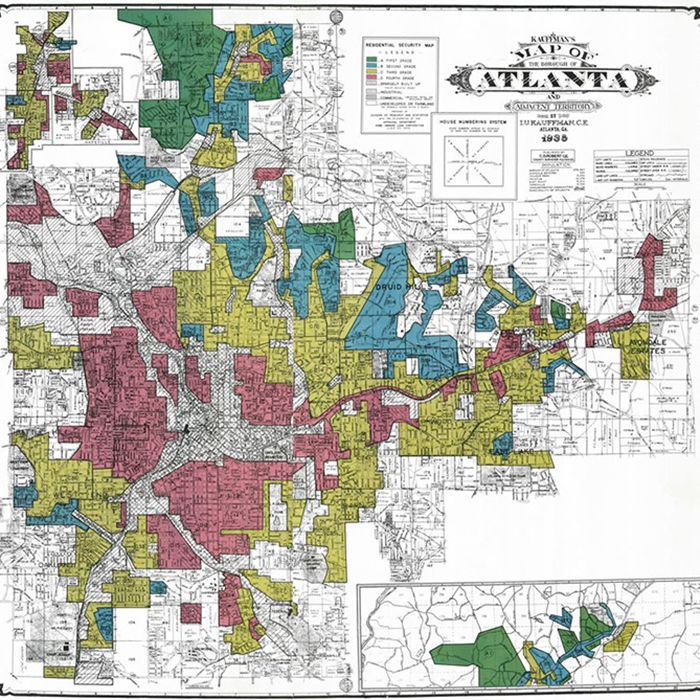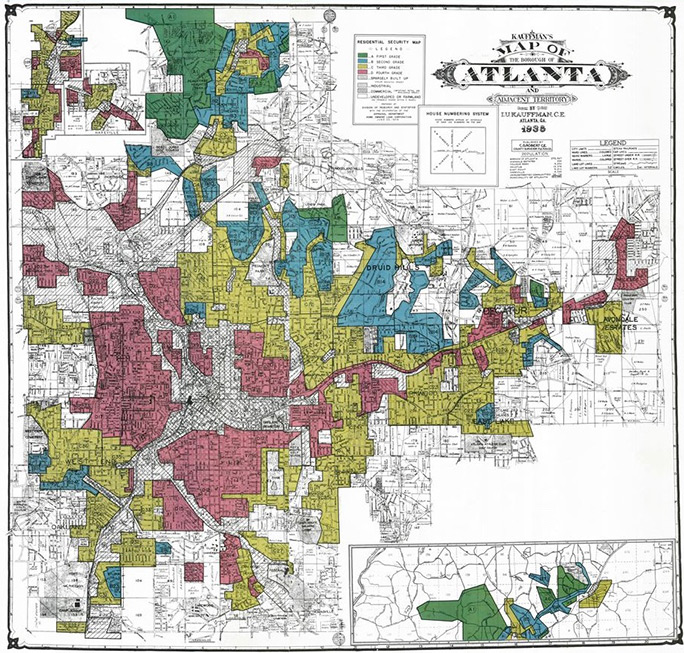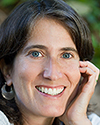Partnerships for Environmental Public Health (PEPH)

Redlining Still Affects Health Today
June 15, 2022
Interviewee: Rachel Morello-Frosch, Ph.D.
In this episode, we’ll hear from Rachel Morello-Frosch, Ph.D., who discusses how historical policies have shaped disparities in health and environmental exposures today.
(Image: This map of Atlanta from 1938 illustrates redlining. Red areas were largely African American communities and considered high risk for mortgage lenders. Image courtesy of National Archives and Records Administration, Mapping Inequality.)
Redlining Still Affects Health Today

Discriminatory policies of the past, such as the exclusionary real estate lending practice of redlining, influenced which communities had access to green space and other health-promoting resources, and which were exposed to more pollution from traffic, industry, and other sources. Largely based on race, those policies typically disfavored neighborhoods comprised of people of color. Many present-day communities still reflect these patterns.
In this episode, we’ll hear from Rachel Morello-Frosch, Ph.D., who discusses how historical policies have shaped disparities in health and environmental exposures today.
Interviewee:

Rachel Morello-Frosch, Ph.D., is a professor in the Department of Environmental Science, Policy, and Management and the School of Public Health at the University of California, Berkeley. As an environmental health scientist and epidemiologist, Morello-Frosch examines social determinants of environmental health among diverse communities in the U.S., with a focus on social inequality and psychosocial stress, and how exposure to environmental contaminants influences those factors. Her work has examined that question in the context of air pollution, drinking water quality, and climate change. She collaborates with other scientists and community partners to leverage public data and apply community-based participatory research methods to conduct her research. Morello-Frosch has developed tools for assessing the cumulative impacts of chemical and non-chemical stressors to improve regulatory decision-making and advance environmental justice in California.
Resources:
- Check out the Mapping Inequality Project to explore historical redlining maps, documents, and data for more than 200 U.S. cities.
References:
- Gonzalez DJX, Nardone A, Nguyen AV, Morello-Frosch R, Casey JA. 2022. Historic redlining and the siting of oil and gas wells in the United States. J Expo Sci Environ Epidemiol. doi: 10.1038/s41370-022-00434-9. [Full Text Gonzalez DJX, Nardone A, Nguyen AV, Morello-Frosch R, Casey JA. 2022. Historic redlining and the siting of oil and gas wells in the United States. J Expo Sci Environ Epidemiol. doi: 10.1038/s41370-022-00434-9.]
- Lane HM, Morello-Frosch R, Marshall JD, Apte JS. 2022. Historical redlining is associated with present-day air pollution disparities in U.S. cities. Environ Sci Technol Lett. 9(4):345-350. [Full Text Lane HM, Morello-Frosch R, Marshall JD, Apte JS. 2022. Historical redlining is associated with present-day air pollution disparities in U.S. cities. Environ Sci Technol Lett. 9(4):345-350.]
- Nardone A, Rudolph KE, Morello-Frosch R, Casey JA. 2022. Redlines and greenspace: the relationship between historical redlining and 2010 greenspace across the United States. Environ Health Perspect. 129(1):17006. [Full Text Nardone A, Rudolph KE, Morello-Frosch R, Casey JA. 2022. Redlines and greenspace: the relationship between historical redlining and 2010 greenspace across the United States. Environ Health Perspect. 129(1):17006.]
- Nardone A, Casey JA, Morello-Frosch R, Mujahid M, Balmes JR, Thakur N. 2020. Associations between historical residential redlining and current age-adjusted rates of emergency department visits due to asthma across eight cities in California: an ecological study. Lancet Planet Health. 4(1):e24-e31. [Full Text Nardone A, Casey JA, Morello-Frosch R, Mujahid M, Balmes JR, Thakur N. 2020. Associations between historical residential redlining and current age-adjusted rates of emergency department visits due to asthma across eight cities in California: an ecological study. Lancet Planet Health. 4(1):e24-e31.]
- Nardone AL, Casey JA, Rudolph KE, Karasek D, Mujahid M, Morello-Frosch R. 2020. Associations between historical redlining and birth outcomes from 2006 through 2015 in California. PLoS One. 15(8):e0237241. [Full Text Nardone AL, Casey JA, Rudolph KE, Karasek D, Mujahid M, Morello-Frosch R. 2020. Associations between historical redlining and birth outcomes from 2006 through 2015 in California. PLoS One. 15(8):e0237241.]
- Casey JA, Morello-Frosch R, Mennitt DJ, Fristrup K, Ogburn EL, James P. 2017. Race/ethnicity, socioeconomic status, residential segregation, and spatial variation in noise exposure in the contiguous United States. Environ Health Perspect. 125(7):077017. [Full Text Casey JA, Morello-Frosch R, Mennitt DJ, Fristrup K, Ogburn EL, James P. 2017. Race/ethnicity, socioeconomic status, residential segregation, and spatial variation in noise exposure in the contiguous United States. Environ Health Perspect. 125(7):077017.]


